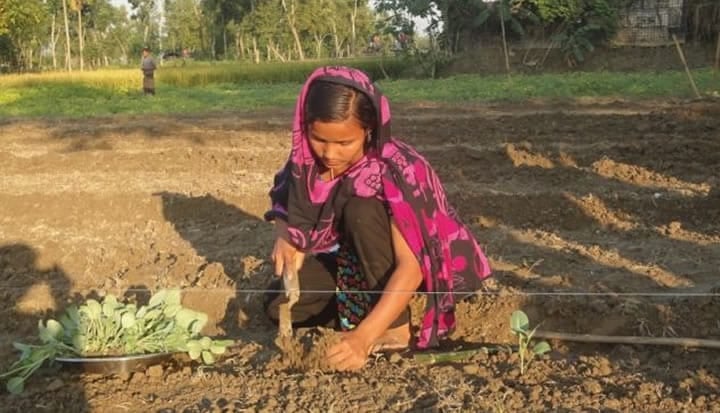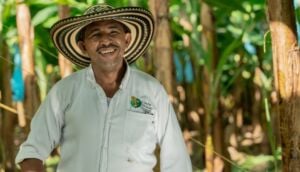Wal-Mart Stores, Inc.
Global food supply needs to increase 70 percent by 2050 to keep up with population growth and diet changes.
How do we generate enough food without cutting down every last tree, and using every last drop of water? And how can we do it while preserving farmer livelihoods and keeping food affordable? The intersection of big and small — international retailers and smallholders — provides compelling insight and hope for sustainable agriculture intensification.
As the world’s largest grocer, Walmart sources from farms of all sizes, and smallholders play a particularly important role in providing fruits and vegetables (among other commodities) for our hundreds of millions of customers in 27 countries. We estimate that Walmart sources US $4 billion in goods from up to 1.4 million small and medium-sized farmers.
Large-scale retailers encounter challenges in sourcing from smallholders: lack of transportation to get products to market; lack of processing infrastructure to produce value-added products; sub-optimal farming practices (resulting in lower yields, inferior quality, environmental issues, and food safety issues); insufficient capital at farm level to pay for seed, fertilizer, and tools; and disputes over access to land and water.
While these challenges are real, Walmart has found that large retailers and smallholders can accelerate improvements in the social and environmental sustainability of the food system, especially by partnering with the development community, investors, and governments.
Here are five examples of how a large retailer can contribute to sustainable development, working with smallholders:
First, a retailer’s ability to make longer-term, higher-volume commitments — and provide technical assistance — can help provide farmers with the certainty and tools they need to invest in improvements. When farmers are more confident that their products will be bought at a known time and price, they can make changes that increase yields, optimize inputs, and improve their livelihoods. In exchange, retailers secure higher quality produce.
In Kenya, for example, Walmart is undertaking a project to help train 400 smallholder growers who produce the delicious sweet yellow passion fruits we sell in our ASDA stores.
Through our work with Wilmar Flowers Limited, TechnoServe, and the United Kingdom’s Department for International Development, women and men have been trained in good agricultural practices, productivity and quality. At the end of the first phase of the project, we saw our growers’ passion fruit incomes increase 71 percent.
Second, long-term and large-scale retail purchasing commitments build the confidence of third parties to invest capital in processing infrastructure, labor training, and raw materials.
In West Africa, Walmart is now buying cashews from strategically selected processors who demonstrate a commitment to invest in labor training, worker insurance, and facility daycare. We support such investment, because it helps smallholders and communities thrive, while creating food traceability and enhancing cashew quality and yields. Our cashew purchase commitments have led to financial institutions making loans to processing facilities, enabling them to increase output and efficiencies to capture a higher-value share of the increasing global cashew demand.
Third, larger retailers can often utilize an entire crop. With apples for example, Walmart sells fresh, whole apples in our stores, but we also use blemished apples and apple parts for our Great Value apple juice and apple sauce. Using entire crops cuts down on food waste, increases the world’s food supply, and increases farmer income.
Fourth, a large retailer can promote more sustainable practices on farms, whether big or small, through sourcing policies, and by helping suppliers track and report key data such as yields, water input, fertilizer input, and greenhouse gas emissions.
Walmart’s Climate Smart Agriculture Platform, for example, will increase management, tracking, and reporting of key metrics, and thereby drive improvements in agricultural productivity and responsible resource utilization regardless of the location or size of the farm. Fifth, food retailers are increasingly using philanthropy to address sustainability. Walmart and the Walmart Foundation have committed, for example, to train one million small and medium farmers in emerging markets, working with partners such as USAID and the Gates Foundation.
To date, we have funded training for nearly 800,000 smallholder farmers throughout Africa, Asia and Latin America — more than half of them women. The Walmart Foundation has also provided grants to strengthen market access for farmers — such as through Winrock International — and environmental sustainability — such as our Sustainable Fisheries Partnership in southeast Asia, which also has a special emphasis on women.
Significantly increasing food supply in a sustainable way will require substantial innovation across the food system — across crops, growing regions, and players, including at the intersection of big and small. Walmart is excited to work with others to learn more about what works and what doesn’t, and to contribute to solutions that help all.










